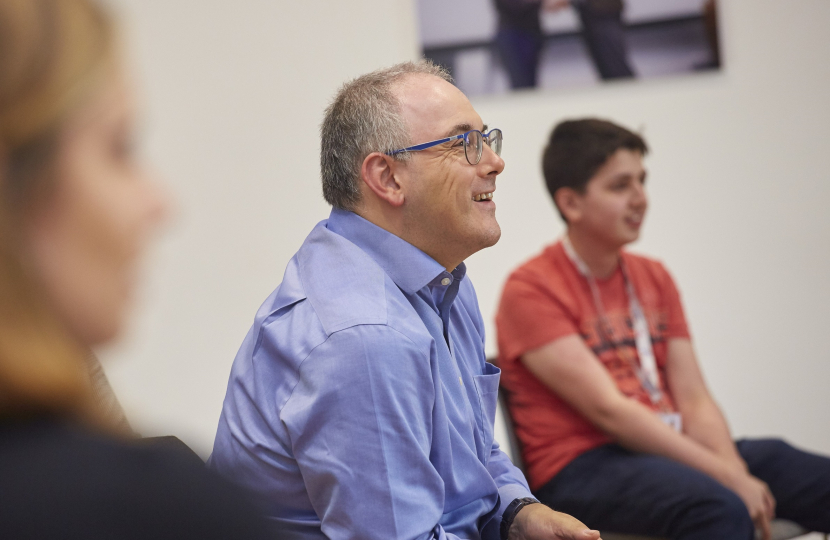
Minister for Skills, Apprenticeships and Higher Education, Robert Halfon, delivered a speech at the UCAS Admissions Conference 2023
Hello everyone. I’m very sorry that I can’t be with you today as planned - because I think UCAS is brilliant. It’s one of our great institutions, alongside all the other great institutions it serves. It helps young people to bridge the gap between school and the great unknown, supporting them to navigate all their options for further study. Like myself, it’s passionate about providing applicants with the path that’s right for them.
As offers season draws to a close, teenagers across the country are now lining-up their post-school options as they finish revision before exams. I know your role can sometimes be almost pastoral - particularly on results day - advising young people on what’s available to build the best education foundation for their future. I’d like to thank everyone here for the work you do to facilitate this progression, by guiding thousands of young lives each year.
I also want to thank you for your support of students and applicants during the pandemic. This episode of unprecedented disruption is now, thank goodness, behind us, but I know its effects will be felt for some time. This is reflected in your student-centred approach to admissions, and in how we’re returning to pre-pandemic grading this summer. Where national performance is lower than prior to the pandemic, senior examiners will make allowances in grade boundaries to acknowledge the last 3 years’ disruption. This means a UCAS applicant should be just as likely to achieve a particular grade this year, as they would have been in 2019.
As you know, I believe higher education should serve society with high quality degrees, that lead to jobs, skills and social justice.
UCAS is helping this government to propel the skills revolution, righting the balance between academic and vocational qualifications. Young people need to leave education with skills the jobs market is demanding, which will in turn power economic growth. In 2023, higher education is a considerable investment. For those who choose to give it their time and future earnings, a good job must be the pay-off.
And universities should do all they can to welcome those who need good jobs the most - applicants with great capability but the least advantages in life. And certainly not the family connections to show them the sectors where they could thrive.
Higher education should perpetuate social justice - not reinforce the status quo, passing privilege hand-to-hand down the generations. It should extend its intake wherever it can, and leverage its prestige to acknowledge the high career value of high-quality technical education.
This is where degree-level apprenticeships come in. No one should be surprised to hear me championing these prestigious courses, which offer superb vocational and academic education at some of our best universities. They hold particular value for less well-off students, preparing them for a successful career, whilst allowing them to earn while they learn without tuition fees.
There are now almost 160 apprenticeship standards at Levels 6 and 7, for occupations including nursing, aerospace engineering and journalism. Word is spreading. Degree-level apprenticeships make up 16% of all starts so far this year [August 2022 -Feb 2023], with numbers up 11% compared to the same period last year. This follows year-on-year growth, with a total of over 185,000 starts since their introduction in 2014.
There is much more to do to meet rising demand - and to spread the word to build that demand still further. We’re working with higher education institutions to increase supply of both employer vacancies, and applications from young people. Over the next 2 years we are providing an additional £40 million to support providers to expand degree apprenticeships, and help more applicants access these opportunities. Building on our £8 million investment last year, this funding could transform the uptake of degree apprenticeships. More people, from more diverse backgrounds, entering professions that might have been closed to them without a traditional, expensive, undergraduate degree. That would be real social justice in action.
As with Levels 6-7, technical education for sixteen-year-olds has long been seen as the poor relation of academic courses. In 2020, we brought in T Levels to change that. These offer a credible alternative to A levels, drawing on the best of Level 3 technical education from around the world.
We know universities may take time to get to grips the performance standards of T Level grades, particularly in comparison to other vocational qualifications. T Levels were designed to ensure rigour and quality, and their performance standards are more aligned with A levels to reflect that.
I appreciate T Levels represent a significant change, which means recalibrating offers to recognise the difference between their grades and existing vocational qualifications. I’d ask you to recognise just how stretching these qualifications are in your admissions policies, particularly when considering which students to accept onto courses this year.
Last summer many universities embraced T Levels’ value, and the achievements of the pioneering students who’d studied for them. For those yet to do so, I would urge every institution to do justice to these young people’s efforts, and provide a clear online statement of relevant courses and entry requirements for T Levels.
Although it’s primarily known for university admissions, UCAS shares our vision to demystify and promote all the options available to 18-year-olds. Their next step could be higher education. But it doesn’t have to be, particularly for someone who thrives in the workplace rather than the library, and enjoys putting their tuition to immediate use. We want to raise young people’s awareness of the many routes up the Ladder of Opportunity, to good jobs and higher wages.
With a million young people expected to be able to apply to UCAS by the end of the decade, we need high quality provision of all kinds to await them. My ambition is that UCAS will eventually stand for the Universities, Colleges, Apprenticeships and Skills service.
The UCAS Hub already does a brilliant job of engaging users with many of the choices relevant to their career aspirations, including links on where to go next. From this autumn, apprenticeships will sit alongside degree courses on the Hub, with subject searches displaying all relevant routes. Apprenticeships from Level 2 through to degree level will be displayed, giving them new visibility on the platform and functional parity with traditional degrees. Search results will also show affordability, duration of training or study required, and likely career outcomes. Presenting all this information in one place will better inform applicants’ decisions on the right course for them.
And from next year, young people will be able to apply for apprenticeships via the UCAS Hub, creating a comprehensive gateway for post-16 options. This forms part of our broader vision to integrate skills into the formal systems that direct people through education towards the labour market. We want to eventually create a one-stop-shop, where citizens can explore their career and training options at any point in their lives.
At the start of that journey, school pupils will be fully appraised of all their post-16 choices and where these could lead. We’ve recently formed a partnership with UCAS to raise 18 year-olds’ awareness of apprenticeships, in order to increase starts in this age group. Students will be better supported to apply for apprenticeships, and employers given access to promote vacancies to local schools and colleges. This will create a talent pipeline for businesses, enabling them to fill skills gaps and offer further apprenticeships. It will result in improved opportunities for under-represented groups, and a virtuous circle of apprenticeships demand and supply.
None of these big ambitions would be possible without your collaboration. I know everyone here is united in supporting the ambitions of the young (and not so young) people who apply through UCAS each year. I believe these ambitions are intrinsically linked; our plans could make a seismic difference to the prosperity of future generations, our society and the economy.
I want to thank you again for your remarkable work with government in the past, present, and future.
I hope you enjoy the rest of today’s events, building bridges to bright futures for upcoming generations.
